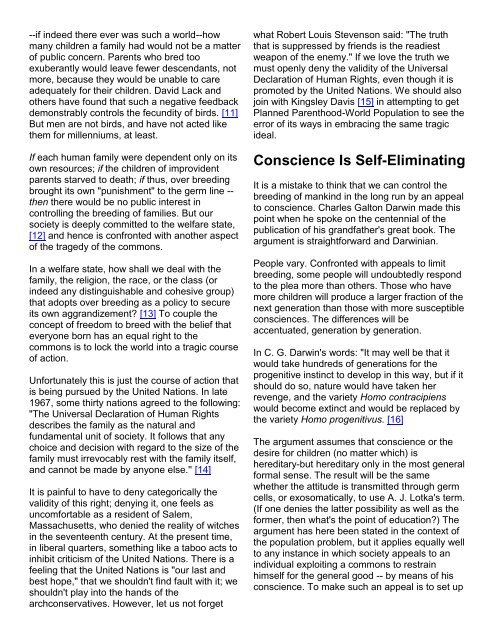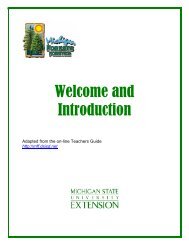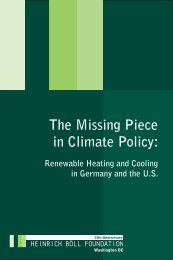The Tragedy of the Commons What Shall We Maximize?
The Tragedy of the Commons What Shall We Maximize?
The Tragedy of the Commons What Shall We Maximize?
You also want an ePaper? Increase the reach of your titles
YUMPU automatically turns print PDFs into web optimized ePapers that Google loves.
--if indeed <strong>the</strong>re ever was such a world--howmany children a family had would not be a matter<strong>of</strong> public concern. Parents who bred tooexuberantly would leave fewer descendants, notmore, because <strong>the</strong>y would be unable to careadequately for <strong>the</strong>ir children. David Lack ando<strong>the</strong>rs have found that such a negative feedbackdemonstrably controls <strong>the</strong> fecundity <strong>of</strong> birds. [11]But men are not birds, and have not acted like<strong>the</strong>m for millenniums, at least.If each human family were dependent only on itsown resources; if <strong>the</strong> children <strong>of</strong> improvidentparents starved to death; if thus, over breedingbrought its own "punishment" to <strong>the</strong> germ line --<strong>the</strong>n <strong>the</strong>re would be no public interest incontrolling <strong>the</strong> breeding <strong>of</strong> families. But oursociety is deeply committed to <strong>the</strong> welfare state,[12] and hence is confronted with ano<strong>the</strong>r aspect<strong>of</strong> <strong>the</strong> tragedy <strong>of</strong> <strong>the</strong> commons.In a welfare state, how shall we deal with <strong>the</strong>family, <strong>the</strong> religion, <strong>the</strong> race, or <strong>the</strong> class (orindeed any distinguishable and cohesive group)that adopts over breeding as a policy to secureits own aggrandizement? [13] To couple <strong>the</strong>concept <strong>of</strong> freedom to breed with <strong>the</strong> belief thateveryone born has an equal right to <strong>the</strong>commons is to lock <strong>the</strong> world into a tragic course<strong>of</strong> action.Unfortunately this is just <strong>the</strong> course <strong>of</strong> action thatis being pursued by <strong>the</strong> United Nations. In late1967, some thirty nations agreed to <strong>the</strong> following:"<strong>The</strong> Universal Declaration <strong>of</strong> Human Rightsdescribes <strong>the</strong> family as <strong>the</strong> natural andfundamental unit <strong>of</strong> society. It follows that anychoice and decision with regard to <strong>the</strong> size <strong>of</strong> <strong>the</strong>family must irrevocably rest with <strong>the</strong> family itself,and cannot be made by anyone else.'' [14]It is painful to have to deny categorically <strong>the</strong>validity <strong>of</strong> this right; denying it, one feels asuncomfortable as a resident <strong>of</strong> Salem,Massachusetts, who denied <strong>the</strong> reality <strong>of</strong> witchesin <strong>the</strong> seventeenth century. At <strong>the</strong> present time,in liberal quarters, something like a taboo acts toinhibit criticism <strong>of</strong> <strong>the</strong> United Nations. <strong>The</strong>re is afeeling that <strong>the</strong> United Nations is "our last andbest hope," that we shouldn't find fault with it; weshouldn't play into <strong>the</strong> hands <strong>of</strong> <strong>the</strong>archconservatives. However, let us not forgetwhat Robert Louis Stevenson said: "<strong>The</strong> truththat is suppressed by friends is <strong>the</strong> readiestweapon <strong>of</strong> <strong>the</strong> enemy." If we love <strong>the</strong> truth wemust openly deny <strong>the</strong> validity <strong>of</strong> <strong>the</strong> UniversalDeclaration <strong>of</strong> Human Rights, even though it ispromoted by <strong>the</strong> United Nations. <strong>We</strong> should alsojoin with Kingsley Davis [15] in attempting to getPlanned Parenthood-World Population to see <strong>the</strong>error <strong>of</strong> its ways in embracing <strong>the</strong> same tragicideal.Conscience Is Self-EliminatingIt is a mistake to think that we can control <strong>the</strong>breeding <strong>of</strong> mankind in <strong>the</strong> long run by an appealto conscience. Charles Galton Darwin made thispoint when he spoke on <strong>the</strong> centennial <strong>of</strong> <strong>the</strong>publication <strong>of</strong> his grandfa<strong>the</strong>r's great book. <strong>The</strong>argument is straightforward and Darwinian.People vary. Confronted with appeals to limitbreeding, some people will undoubtedly respondto <strong>the</strong> plea more than o<strong>the</strong>rs. Those who havemore children will produce a larger fraction <strong>of</strong> <strong>the</strong>next generation than those with more susceptibleconsciences. <strong>The</strong> differences will beaccentuated, generation by generation.In C. G. Darwin's words: "It may well be that itwould take hundreds <strong>of</strong> generations for <strong>the</strong>progenitive instinct to develop in this way, but if itshould do so, nature would have taken herrevenge, and <strong>the</strong> variety Homo contracipienswould become extinct and would be replaced by<strong>the</strong> variety Homo progenitivus. [16]<strong>The</strong> argument assumes that conscience or <strong>the</strong>desire for children (no matter which) ishereditary-but hereditary only in <strong>the</strong> most generalformal sense. <strong>The</strong> result will be <strong>the</strong> samewhe<strong>the</strong>r <strong>the</strong> attitude is transmitted through germcells, or exosomatically, to use A. J. Lotka's term.(If one denies <strong>the</strong> latter possibility as well as <strong>the</strong>former, <strong>the</strong>n what's <strong>the</strong> point <strong>of</strong> education?) <strong>The</strong>argument has here been stated in <strong>the</strong> context <strong>of</strong><strong>the</strong> population problem, but it applies equally wellto any instance in which society appeals to anindividual exploiting a commons to restrainhimself for <strong>the</strong> general good -- by means <strong>of</strong> hisconscience. To make such an appeal is to set up






